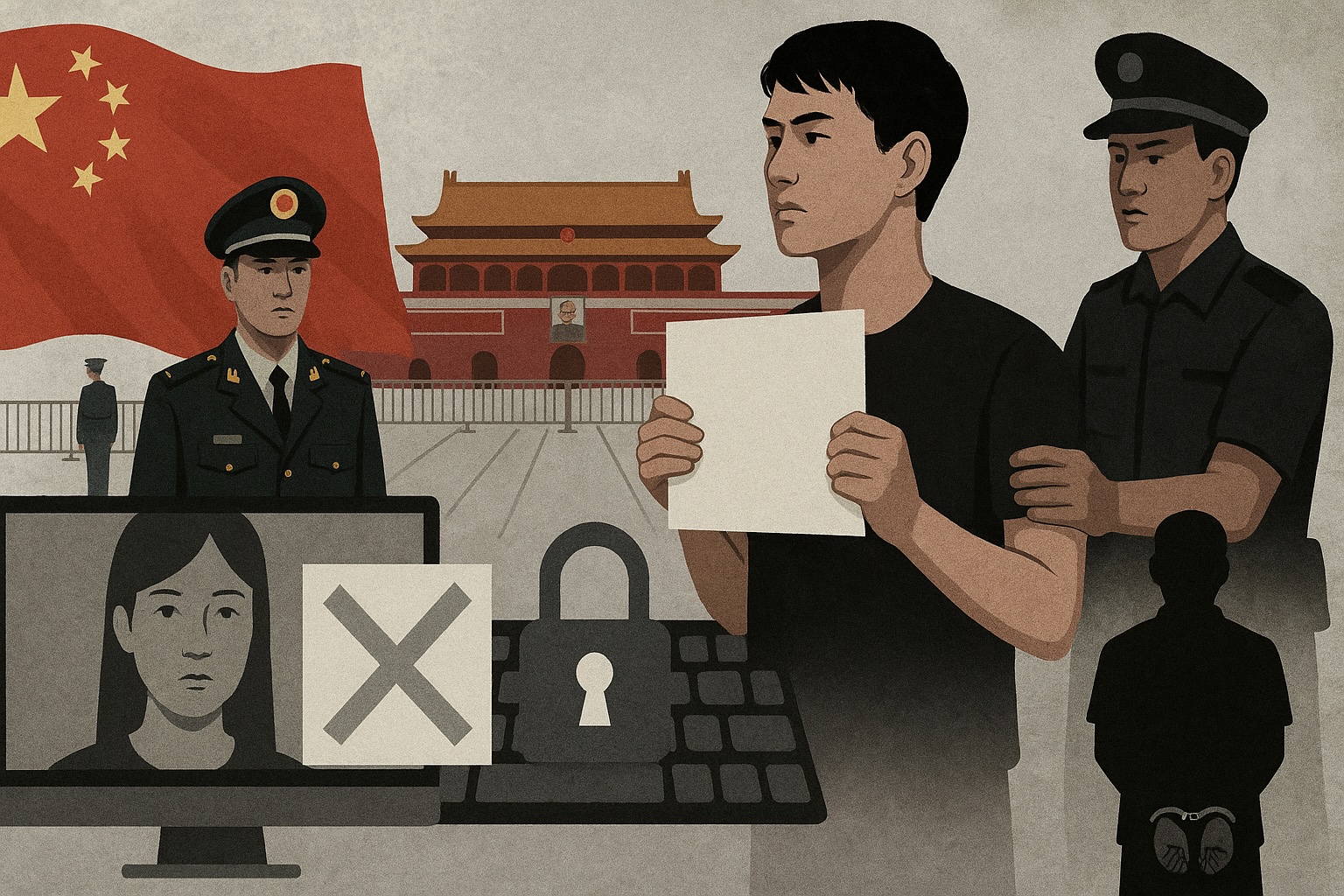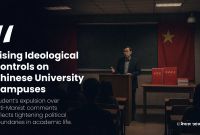China’s Historical Erasure: 36 Years after Tiananmen, Suppression Persists

On June 4, 2024, China reinforced its grip on historical narratives by tightening security in Beijing and banning commemorations in Hong Kong. The CCP’s authoritarian measures extend beyond physical restrictions—they systematically silence dissent through censorship, arrests, and intimidation.
The Chinese Communist Party (CCP) continues to silence democracy advocates, particularly young activists commemorating the Tiananmen Square crackdown. Authorities detain dissenters, erasing their voices through censorship and intimidation. Universities and social media are heavily monitored, suppressing discussions on democratic ideals. Journalists, scholars, and human rights defenders face imprisonment for exposing government abuses. Despite repression, underground movements persist, proving the resilience of those fighting for democratic freedoms.
The Chinese Communist Party (CCP) enforces strict control over free speech, erasing references to the Tiananmen Square crackdown from public discourse. Foreign media reports are blocked, online discussions deleted, and independent publishers shut down. Social media platforms are heavily monitored, silencing dissenting voices. This systematic suppression reflects the CCP’s broader strategy to control narratives, restrict access to uncensored information, and eliminate opposition.
Despite relentless suppression by the Chinese Communist Party (CCP), the desire for emancipation among Chinese citizens remains strong. Underground movements secretly commemorate June 4, defying government restrictions. Young people bypass censorship using VPNs to access uncensored information. The CCP’s efforts to erase historical memory have not extinguished the demand for democratic reform, as activists continue to challenge authoritarian control and fight for political change.
The CCP’s relentless control over free speech and historical memory underscores its fear of democratic ideals. Yet, the resilience of Chinese citizens proves that the demand for truth and freedom cannot be extinguished.
The White Paper Movement emerged in late November 2022, as a silent yet powerful protest against the Chinese Communist Party’s (CCP) strict zero-COVID policies. Holding blank sheets of paper, students symbolized the censorship that prevents them from expressing dissent. This movement mirrors the Tiananmen Square protests of 1989, where students demanded political reform and democratic freedoms.
Both movements were led by young activists who risked their safety to challenge authoritarian rule. The Tiananmen protesters faced brutal military suppression, while White Paper activists encountered mass arrests and surveillance. Despite decades of repression, the desire for democracy remains strong among China’s youth, proving that the fight for freedom is far from over. The White Paper Movement reflects the same aspirations for democracy that fuelled Tiananmen’s protests. Though the CCP silences dissent, the resilience of Chinese students demonstrates that the demand for political change endures.
Chinese authorities have significantly tightened security around Tiananmen Square, deploying checkpoints and increasing police presence to prevent public gatherings. Major roads leading to the square are lined with security forces, ensuring restricted access. Additionally, the government continues to censor discussions of the crackdown, swiftly erasing mentions on social media and blocking foreign journalists from reporting on the event. These measures reflect China's ongoing efforts to suppress public remembrance and control historical narratives.
Global reactions to the 35th anniversary of the Tiananmen Square crackdown have been strong. Taiwan held a large vigil at Liberty Square, honouring victims. Western governments, including the U.S., condemned China’s suppression, with key figures marking the anniversary. Human rights organizations continue to demand accountability, urging China to acknowledge the events and address historical repression. The international response highlights the ongoing struggle for justice and transparency.
The Chinese government continues to justify the Tiananmen Square crackdown as a necessary action to maintain stability, dismissing foreign criticism as interference in internal affairs. Officials reaffirm that China has a "clear conclusion" on the events of 1989 but refuse to elaborate further. The Communist Party frames the protests as political unrest rather than a pro-democracy movement, ensuring discussions remain heavily censored.
The suppression of commemorations in Hong Kong reflects the lasting impact of the National Security Law on civil liberties, restricting freedom of expression and assembly. Many young people in China remain unaware of the Tiananmen Square crackdown due to censorship. Despite restrictions, Hong Kong residents discreetly mark the anniversary, demonstrating resilience against authoritarian control and the ongoing struggle for free expression.
The 35th anniversary of the Tiananmen Square crackdown underscores China's persistent efforts to suppress public remembrance and control historical narratives. Heightened security in Beijing and arrests in Hong Kong reflect the ongoing struggle between authoritarian control and the demand for truth. Despite censorship, global calls for accountability persist, keeping the legacy of June 4, 1989, central to discussions on human rights and political freedom. The resilience of those who continue to commemorate the event highlights the enduring fight for justice.




![From Kathmandu to the World: How Excel Students Are Winning Big [Admission Open]](https://nepalaaja.com/img/70194/medium/excel-college-info-eng-nep-2342.jpg)
